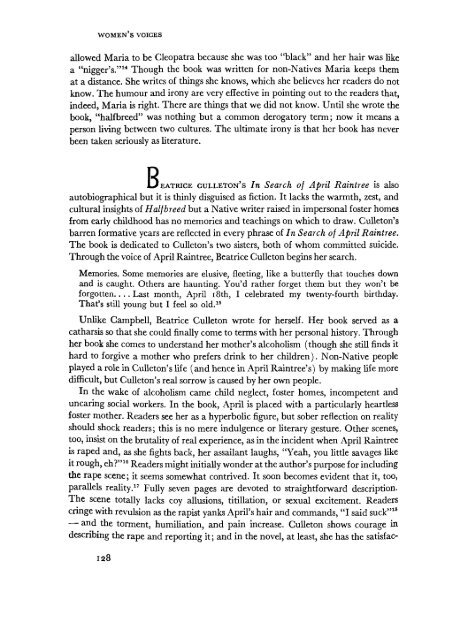CONTEMPORARY NATIVE WOMEN'S VOICES IN LITERATURE
CONTEMPORARY NATIVE WOMEN'S VOICES IN LITERATURE
CONTEMPORARY NATIVE WOMEN'S VOICES IN LITERATURE
You also want an ePaper? Increase the reach of your titles
YUMPU automatically turns print PDFs into web optimized ePapers that Google loves.
WOMEN S <strong>VOICES</strong>allowed Maria to be Cleopatra because she was too "black" and her hair was likea "nigger's." 14 Though the book was written for non-Natives Maria keeps themat a distance. She writes of things she knows, which she believes her readers do notknow. The humour and irony are very effective in pointing out to the readers that,indeed, Maria is right. There are things that we did not know. Until she wrote thebook, "halfbreed" was nothing but a common derogatory term; now it means aperson living between two cultures. The ultimate irony is that her book has neverbeen taken seriously as literature.UEATRICE CULLETON'S In Search of April Raintree is alsoautobiographical but it is thinly disguised as fiction. It lacks the warmth, zest, andcultural insights of Halfbreed but a Native writer raised in impersonal foster homesfrom early childhood has no memories and teachings on which to draw. Culleton'sbarren formative years are reflected in every phrase of In Search of April Raintree.The book is dedicated to Culleton's two sisters, both of whom committed suicide.Through the voice of April Raintree, Beatrice Culleton begins her search.Memories. Some memories are elusive, fleeting, like a butterfly that touches downand is caught. Others are haunting. You'd rather forget them but they won't beforgotten.. . . Last month, April i8th, I celebrated my twenty-fourth birthday.That's still young but I feel so old. 15Unlike Campbell, Beatrice Culleton wrote for herself. Her book served as acatharsis so that she could finally come to terms with her personal history. Throughher book she comes to understand her mother's alcoholism (though she still finds ithard to forgive a mother who prefers drink to her children). Non-Native peopleplayed a role in Culleton's life (and hence in April Raintree's) by making life moredifficult, but Culleton's real sorrow is caused by her own people.In the wake of alcoholism came child neglect, foster homes, incompetent anduncaring social workers. In the book, April is placed with a particularly heartlessfoster mother. Readers see her as a hyperbolic figure, but sober reflection on realityshould shock readers; this is no mere indulgence or literary gesture. Other scenes,too, insist on the brutality of real experience, as in the incident when April Raintreeis raped and, as she fights back, her assailant laughs, "Yeah, you little savages likeit rough, eh?" 16 Readers might initially wonder at the author's purpose for includingthe rape scene ; it seems somewhat contrived. It soon becomes evident that it, too,parallels reality. 17 Fully seven pages are devoted to straightforward description.The scene totally lacks coy allusions, titillation, or sexual excitement. Readerscringe with revulsion as the rapist yanks April's hair and commands, "I said suck" 18— and the torment, humiliation, and pain increase. Culleton shows courage indescribing the rape and reporting it; and in the novel, at least, she has the satisfac-128

















